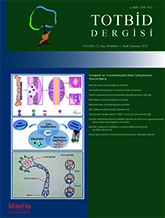
Periprosthetic joint infections (PJI) are the infections that negatively affect the quality of life of patients and have high treatment costs. Periprosthetic joint infections are among the most common causes of revision surgery in total joint arthroplasty. The most frequently applied surgical methods for PJI are; Debridement, Antibiotics, and Implant Retention (DAIR) and one-stage or two-stage revision surgeries. Treatment of biofilm on arthroplasty materials becomes unimportant in revision surgeries where all implanted components are removed or replaced. The focus of this review is on implant-retaining treatment strategies all treatments are largely antibiotic- based. For antibiotics to be more effective, it is necessary to add antibiofilm treatments to disrupt the protective biofilm barrier so that the bacteria switched from their dormant, metabolically low-activity state and become vulnerable to attack. In order to increase the success rate, new treatment modalities are being developed apart from the standard PJI strategies. This article focuses on new treatment options as well as basic information about biofilm from many aspects. Although many of the techniques discussed in the studies have only been investigated in-vitro or in-vivo, these studies lead to the formation of new treatment strategies in the future.